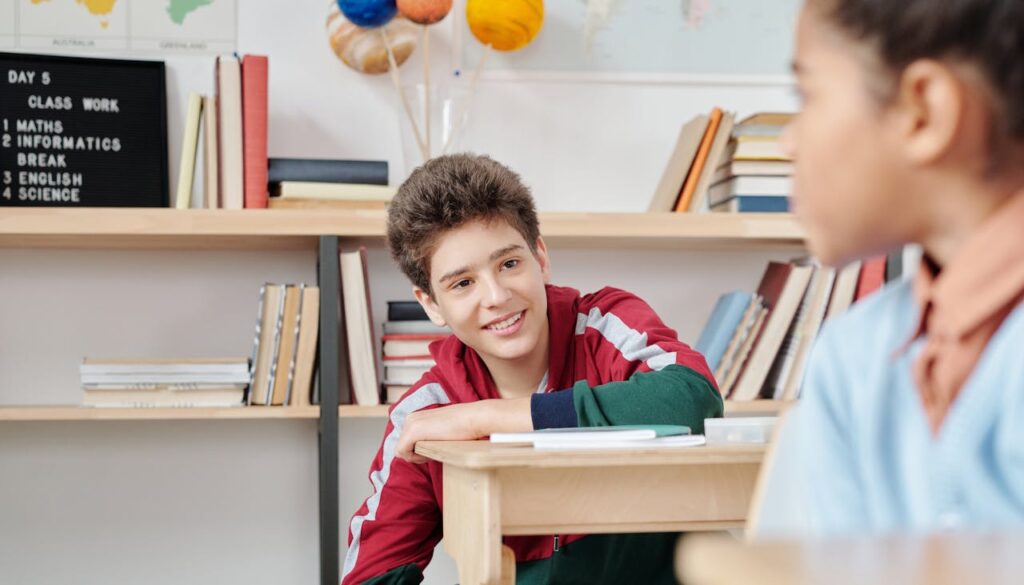School does not always go perfectly for children. They run into challenges. They get into conflicts. Sometimes, they don’t handle it the way they should. That’s when you, the parent, receive a note or phone call letting you know that your child is misbehaving at school. What do you do? It’s normal to feel worried, embarrassed, or even mad in this moment. But take a deep breath. Trouble at school can mean many different things to each child. It could be one bad day, a playground bully, or your child’s first encounter with a subject they don’t understand.
Addressing how to deal with child misbehaving in school the right way is crucial to your child’s healthy development and their academic future. It will also help you build a stronger connection with the school’s ability and prepare you for any other bumps by navigating them together with your child and their teachers. Always remember that your top priority is to prepare your child to succeed and the first step when something happens at school is information gathering.
What happened? Why did it happen? How can you help your child navigate the situation if it happens again? We’ll help you determine what to do when your child has behavior problems at school.
Understanding Child Misbehavior in School
The first step is to learn about the situation. There are many reasons why children misbehave at school and many types of misbehavior. Schools and teachers also respond to child behavior differently, and standards can seem to change all of the sudden for your child from one grade to the next. There may be one or multiple causes for reports that your child is acting out at school.
When deciding how to deal with your child misbehaving at school, begin with investigation.
Types of Misbehavior
- Acting Out
- Yelling or shrieking, playing too roughly, refusing to sit down.
- Your child may be frustrating the teacher with bold actions, disruptive behavior, or willfulness that they can’t control.
- Defiance
- Refusing to do the assignment, saying no, not lining up with the class, not coming in from recess, refusing to answer questions.
- Your child may be actively defying the teacher under one or more circumstances.
- Fighting or Bullying
- Arguing with other children, pushing, rough play, stealing turns, breaking friendships.
- Your child may be conflicting with other children physically or emotionally or displaying poor social skills.
- Wiggles
- Walking around class, not being on task, playing or drawing instead of listening.
- Your child may not be focusing in class, and it is frustrating for the teacher.
Causes of Misbehavior
Before you decide on your parental reaction to the misbehavior, find the source. A child acting out at school can have one or multiple reasons that result in misbehavior. FInding the root cause is the key to finding the solution.
- Conflict with classmates – a fight with classmates can lead to your child getting in trouble, whether or not the other child gets caught.
- Emotional distress – a child who is distressed about something will act out at school.
- Teaching/learning style mismatch – The teacher may not connect with your child or teach in a way they understand.
- Academic insecurity – Children sometimes decide to seem “bad” instead of “dumb” if they don’t understand a subject in class. This might be normal academic struggles or signs of a learning disability.
- New expectations – Your child may not have adapted to the expectations in their new grade to sit still or show certain school manners.
- Hyperactive or ADHD – children who need to wiggle or act while they learn may act out until they have a solution, like drawing or a fidget spinner.
- Bullying – Your child may be getting bullied and act out as a cry for help.
- Hangry – Children, especially young children, may act out if their needs aren’t met. The most common problem is getting hungry before lunch, or the sudden removal of nap time from their school routine.
How to Deal with Child Misbehaving in School: Strategies for Parents
Because there are so many possible causes, there is no “one size fits all” solution on how to deal with child misbehaving in school. Fortunately, you can approach with a few parenting practices that will help you get to the bottom of the issue. Your goal is to determine the root cause, and equip your child with the tools and motivation they need to maintain good behavior when challenges arise in the future.
This approach will help your child build the skills and emotional control they need to succeed throughout their school (and later, their adult) career. Behavior management is key, and your young children will thrive when they understand how to navigate future problems gracefully.
1. Address Behavior Problems with Your Child
The first step is to talk to your child. After you get the call or note, sit down together and initiate a constructive conversation. Explore what your child feels, find out if your child’s needs are being met, and determine what is triggering the bad behavior. It’s important to approach the subject gently. You are not angry, you are curious what went wrong and how to help your child fix the problem.
Hint: If you’re feeling strong emotions, take some time to calm down and center yourself before this talk. Speak gently and help your child understand that you want to understand and help them.
Here are a few examples of effective dialogue techniques:
- “I heard that you didn’t have a good day at school today. Do you want to tell me what happened?”
- “Was there a reason why you pushed Suzy at recess today? What was happening right before there was pushing?”
- “How do you think that made Suzy feel when you pushed her?”
- “Tell me how you were feeling when you pushed the desk over today. It’s okay if it doesn’t make sense.”
- “Are you having trouble with math? Your teacher tells me you haven’t been doing your worksheets lately”
- “What do you think you could have done that would work better next time?”
One of the most common ways children misbehave in school is through bullying. To learn more about identifying and addressing harmful behaviors, check out our article ‘Types of Bullying: Identifying and Addressing Harmful Behaviors.‘ Find out how to tackle this issue effectively and support your child’s well-being.

Credit: Pexels
2. Communicate with Teachers and School Staff
Get in touch with the teachers and school staff as soon as elementary school starts. Your child may not be able to fully explain the problems they are dealing with, and their teacher may have a better perspective and ability to help if your child’s behavior is problematic.
Establish an open communication channel. Start emailing or trading notes with the teacher and meet in person to discuss any recurring problems. It can also help to involve the school psychologist or school counselor if your child seems to be struggling with an emotional issue.
Address teaching and learning styles, find out how to help your child manage their energy or negative emotions, and explore how to change the situation to avoid misbehavior triggers. If you join forces with your child’s teacher, they will likely help you guide your child toward better behavior and problem-solving.
3. Equip Your Child Using Positive Parenting Methods
Positive parenting is one of the keys to how to deal with child misbehaving in school.
Instead of punishment, focus on positive parenting. Use this parenting philosophy to help your child learn the skills they need to navigate challenging situations at school. Positive parenting approaches aim to foster a child’s emotional development, self-esteem, and social skills. At the same time, you seek to reduce negative behaviors through positive guidance and support.
- Reassure your child that you love them and their problems are worth your time to solve.
- Teach your child the social skills they need to recognize and navigate conflict with other children.
- Teach your child the communication skills to ask for what they need or request help when they are about to explode.
- Help your child learn emotional control and how to stay calm when they are getting upset.
- When your child has a bad day, talk out how it could have gone better and encourage them to implement the solutions they come up with on reflection.
- Encourage your child to apologize and reconcile with children or teachers who have been the target of misbehavior.
- Praise your child for learning and growing.
4. Set Clear Expectations and Limits
Children benefit from knowing what is expected of them. Each new year at school can come with new expectations. Moving from kindergarten to first grade can be tough, and they may have a hard time accommodating. The jump to middle school, along with new social skills and ‘big kid’ expectations, can be even more impactful. These kinds of transitions may cause disruptive behavior. You can give your child stability and confidence by establishing consistent rules and providing steady positive reinforcement.
Help your child learn manners and practice school-appropriate behavior at home. Then reward your child for being polite and well-mannered, even if they get frustrated with homework or want something that has been delayed.
5. Encourage Positive Behavior
Always praise positive behavior. One of the most important things to remember in how to deal with child misbehaving in school is that most children don’t want to be “the bad kid”. A child acting out at school is usually wants to be liked, to do well, to have friends, and to get along with their teacher. When a child is acting out, something just isn’t working. Helping your child determine the right behavior and praise them for acting right is the best way to help them succeed.
Teach your child to ask themselves “What can I do to get the best outcome from this situation?” instead of acting emotionally. With encouragement and support, they will learn to be diplomatic instead of blowing up. They can learn to ask for an activity instead of acting out. They can even learn to back off from a negative interaction and take a personal cool-down if you remember to hug and congratulate them for being so mature when they get home.
Staying in touch with the teacher and getting a daily behavior report (on both good and bad days) can help you know when to provide praise for positive behavior, in addition to discussing any challenges on bad days.

Credit: Pexels
When to Seek Professional Help
Of course, sometimes a child’s misbehaving at school may go beyond the ability of parents or teachers to handle it with gentle guidance. Medical and psychological conditions can make it more difficult to navigate a situation that is causing distress and misbehavior as a result. For example, a child with a sensory disorder may be upset by a normal classroom or playground environment. A child with ADHD may need professional help to manage their energy and focus to prevent behavioral issues.
If your child expresses needs that you and their teacher can’t meet, the next logical step is to seek professional help. A counselor, child psychologist, or pediatrician may be able to help you and your child navigate the challenges that have been revealed through their misbehavior. They will help you learn how to deal with child misbehaving in school by solving the root problem instead of addressing the misbehavior itself.
You should also seek professional help if your child’s misbehavior goes beyond what you can handle. If they get violent, hurt themselves or others, or can’t be calmed, this can indicate a problem related to a medical or mental health condition. In this case, both you and your child will benefit from professional guidance.

Credit: Pexels
Conclusion
Knowing how to deal with child misbehaving in school is something all parents must learn. From your child’s first separation anxiety tantrum at preschool to their first fight with a friend in later years, you will be learning how to guide them just as they are learning social skills and self-control. Remember to be kind to yourself and your child as you navigate these choppy waters together.
Rely on proactive and positive parenting by encouraging good behavior and modeling the skills your child will need. Collaborate with schools and teachers to create an environment that nurtures your child’s development of these important skills. Embrace the process of ongoing support and learning for both parents and children as your kids learn how to behave well in school. And get used to the idea that your child acting out at school may happen again—take it easy.
Punishing the child by taking away privileges, such as reducing screen time or removing video games from their routine, is not the solution. If you want to learn how to deal with child misbehaving in school, consider enrolling in one of our online parenting classes to gain a new perspective.
I’m sure that now that you know how to deal with child misbehaving in school, you might be facing other school-related issues. For example, are you finding it challenging to support your child with their homework?” You’re not alone. Many parents face difficulties in guiding their kids through academic tasks and ensuring they stay motivated and on track. If you’re looking for practical advice and proven strategies to help your child navigate homework challenges, you’ll want to read our article, “Kid Doing Homework: Challenges & Strategies for Parents to Support Kid Learning Journey.”
References
Adachi-Mejia, A., Longacre, M., Gibson, J., Beach, M., Titus-Ernstoff, L., & Dalton, M. (2006). Children with a TV in their bedroom at higher risk for being overweight. International Journal Of Obesity, 31(4), 644-651. http://doi.org/10.1038/sj.ijo.0803455
American Psychological Association & National Association for the Education of Young Children. (2001). Violence Prevention for Families of Young Children [Brochure]. American Psychological Association
Sadeghi, S., Ayoubi, S., & Brand, S. (2022). Parenting Styles Predict Future-Oriented Cognition in Children: A Cross-Sectional Study. Children (Basel, Switzerland), 9(10), 1589. https://doi.org/10.3390/children9101589
Tuovinen, S., Tang, X., & Salmela-Aro, K. (2020). Introversion and Social Engagement: Scale Validation, Their Interaction, and Positive Association With Self-Esteem. Frontiers in psychology, 11, 590748. https://doi.org/10.3389/fpsyg.2020.590748









